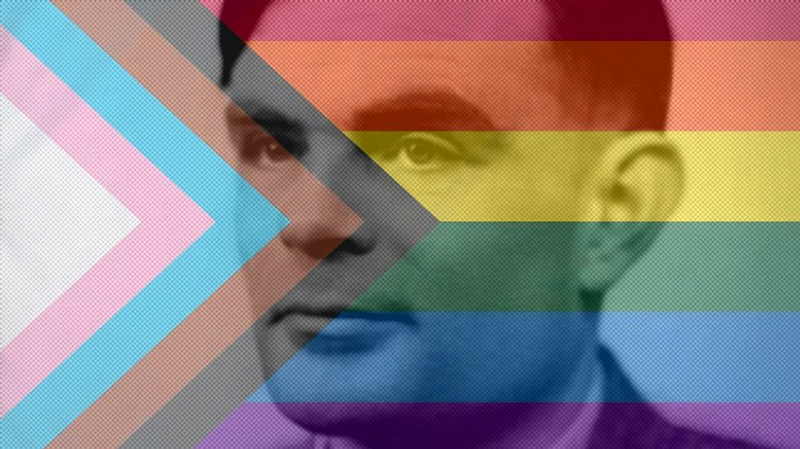Pride Month Reflection: A Call for Awareness and Change
Written on
The Significance of Pride Month
For me, Pride Month serves as a vital measure of the safety and acceptance of our LGBTQIA+ friends, family, and colleagues within our communities. The recent regression in their rights during 2023 is profoundly disheartening.

The injustice faced by individuals like Alan Turing must never be repeated. For instance, in May 2023, Uganda enacted a law that criminalizes homosexuality with the death penalty. This horrific legislation starkly illustrates the ongoing discrimination and dehumanization that LGBTQIA+ individuals endure due to their sexual orientation. This is not merely a relic of history; it is a current crisis.
In June, Pride celebrations occur, allowing businesses to showcase their support for the LGBTQIA+ community and its members. However, what was once a universally embraced event is increasingly mired in misinformation and negativity. The rise in openly expressed disdain towards gay individuals is alarming and should concern us all. Countries like Russia, Hungary, and Poland seem eager to assert their identities by criticizing the West for its acceptance of gay rights, labeling it as a sign of moral decay.
In light of this troubling trend, Medium staff published a piece reaffirming its commitment to LGBTQIA+ rights. A notable comment on this article expressed a sentiment of discomfort: “No hard feelings or disrespect, but this LGBTQ is starting to feel like unwanted propaganda being pushed down people’s throats. Just respect people regardless of their gender, sexuality, or ethnicity. No need to single people out.”
Pride Month is not about forcing beliefs on anyone; it exists to highlight the intentional marginalization of gay individuals, whose existence is as natural as being left-handed. It provides us the opportunity to express our disagreement with severe punishments faced by gay individuals in places like Uganda, reflecting poorly on humanity as a whole.
Chapter 1: Historical Context of LGBTQIA+ Rights
One of the most insightful discussions on Uganda's LGBTQIA+ history comes from Colin Wilson, renowned for his book "The Outsider." Although he struggled to replicate his initial success, his observations in this review about the evolution of sexuality, influenced by historical and cultural factors, resonate deeply. Wilson illustrates how Christian missionaries imposed homophobia on Ugandans through sexual shame, a legacy that continues to fester and deteriorate over time.
A Personal Encounter with Pride
A few years ago, I attended my first Pride parade in my mid-thirties. Growing up in India, I had never witnessed such an event. The 19th-century criminal code from the British era classified acts against “the order of nature” as punishable offenses. While no one at my school openly identified as LGBTQIA+, my parents had a few friends who were gay, and although there was no overt hostility, jokes were common. Thankfully, during my university years, some peers courageously came out. As law students, we studied the historical context of this legislation and recognized its roots in arbitrary European superstitions.
On September 6, 2016, the Indian Supreme Court, a traditionally conservative institution, decriminalized homosexuality—a significant victory for the LGBTQIA+ community after years of struggle. In 2022, Singapore followed suit. However, the damage inflicted by the imposition of Victorian morality on South Asia remains profound and irreversible, with many former colonies continuing to enforce values incompatible with their cultural heritage.
The pride parade I attended prompted me to reflect on my relationships with many individuals I cherish—family members, colleagues, and friends—who identify as gay. One of my most significant artistic commissions came from a gay couple, a gesture none of my straight friends have considered.
The London Pride march that year left a lasting impression on me. One contingent carried a large portrait that caught my attention—it was Alan Turing.
The Legacy of Alan Turing
We are facing pressure from religious extremists and bigots to deny the existence of gay individuals. Yet, the truth is that each of us has benefited from Turing’s brilliance. Those of us enjoying the creative freedoms of the digital age owe much to his pioneering work. Technology companies bear a unique responsibility, as their platforms can perpetuate harmful narratives that undermine democracy and freedom.
Alan Turing's tragic fate underscores the horrors of persecuting someone for their sexual orientation. He is recognized not only as a foundational figure in computing but also as a war hero whose contributions were vital in defeating fascism. Despite his achievements, Turing faced prosecution for his homosexuality, ultimately subjected to inhumane chemical treatments that severely affected his mental health. It is speculated that these cruel punishments contributed to his tragic death by cyanide poisoning, whether as a suicide or an accident.
The Importance of Pride Month
Pride Month, much like any major celebration, has deep historical significance. It serves as a measure of the level of hatred directed towards the LGBTQIA+ community. Nations where Pride events are banned, such as Russia and Uganda, often exhibit corruption and a lack of lawful governance.
The essence of Pride Month is to remember the injustices faced by individuals like Alan Turing. It is a clarion call: never again.